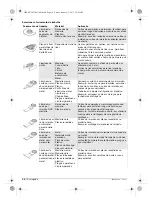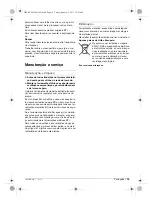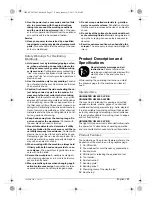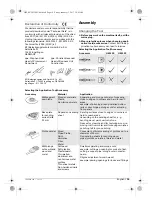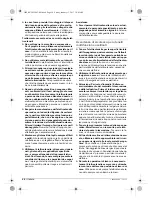
English |
43
1 609 92A 3E6 • 13.1.17
– As far as possible, use a dust extraction sys-
tem suitable for the material.
– Provide for good ventilation of the working
place.
– It is recommended to wear a P2 filter-class res-
pirator.
Observe the relevant regulations in your country
for the materials to be worked.
Prevent dust accumulation at the workplace.
Dust can easily ignite.
Connecting the Dust Extraction (see figure A)
The dust extraction
6
is intended only when work-
ing with the sanding plate
7
; it is not of use in com-
bination with other application tools.
For sanding, always connect the dust extraction.
To mount the dust extraction
6
(accessory), re-
move the application tool and the depth stop
10
.
Slide the dust extraction
6
all the way over the tool
holder
5
onto the collar of the power tool. Turn it to
the required position. Press shut the clamping le-
ver
14
to fix the dust extraction.
Plug the tool sleeve of the vacuum hose
17
onto
the vacuum connection
15
. Connect the vacuum
hose
17
to a vacuum cleaner (accessory).
The vacuum cleaner must be suitable for the mate-
rial being worked.
When vacuuming dry dust that is especially detri-
mental to health or carcinogenic, use a special vac-
uum cleaner.
Operation
Observe correct mains voltage! The voltage of
the power source must agree with the voltage
specified on the nameplate of the machine.
Power tools marked with 230 V can also be op-
erated with 220 V.
Starting Operation
Switching On and Off
To
start
the machine, push the On/Off switch
1
for-
ward so that the
“I”
is indicated on the switch.
To
switch off
the machine, push the On/Off switch
1
toward the rear so that the
“0”
is indicated on the
switch.
To save energy, only switch the power tool on
when using it.
UM 400 SLP BB: The worklight improves visibility
in the immediate work area. It is automatically
switched on and off with the power tool.
Do not look directly into the work area illumina-
tion – your sight can be temporarily degraded!
Preselecting the Orbital Stroke Rate
With the thumbwheel for preselection of the orbital
stroke rate
2
, you can preselect the required orbital
stroke rate, even during operation.
The required stroke rate depends on the material
and the working conditions and can be determined
through practical testing.
Working Advice
Before any work on the machine itself, pull the
mains plug.
Wait until the machine has come to a standstill
before placing it down.
Note:
Do not cover off the venting slots
3
of the ma-
chine while working, as this reduces the working
life of the machine.
Operating Principle
The oscillating drive causes the application
tool/accessory to oscillate back and forth up to
20000 times per minute. This enables precise work
in the tightest of spaces.
Work with low and uniform applica-
tion pressure, otherwise, the work-
ing performance will decline and the
application tool can become
blocked.
While working, move the machine
back and forth, so that the applica-
tion tool does not heat up excessive-
ly and become blocked.
Sawing
Use only undamaged saw blades that are in
perfect condition.
Bent or dull saw blades can
break, negatively influence the cut, or lead to
kickback.
When sawing light building materials, observe
the statutory provisions and the recommenda-
tions of the material suppliers.
Plunge cuts may only be applied to soft mate-
rials, such as wood, gypsum plaster boards,
etc.!
Before sawing with HCS saw blades in wood, parti-
cle board, building materials, etc., check these for
foreign objects such as nails, screws, or similar. If
required, remove foreign objects or use BIM saw
blades.
Separating
Note:
When separating wall tiles take into consid-
eration that the application tools/accessories wear
heavily when used for longer periods of time.
OBJ_BUCH-3003-001.book Page 43 Friday, January 13, 2017 10:03 AM


